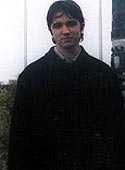 In 2001, Vlad Florin Perju (IIPES 00) received a degree in law from the University of Bucharest. He also spent time studying at the European Academy of Legal Theory in Brussels and the Faculty of Law at the French-Romanian College of European Studies. In 2002, he earned an LL.M. degree at Harvard Law School with the thesis topic: Pluralism, Consensus, and Democratic Legitimacy. He is now working on his S.J.D. Degree in Law in a Pluralist Society at Harvard Law School. He works as a teaching assistant at Harvard College and Harvard Law School. In 2004, he will be published by Ashgate Publications with a chapter titled, “Courts or Legislators: A Study of Democratic Legitimacy in Pluralist Societies.”
In 2001, Vlad Florin Perju (IIPES 00) received a degree in law from the University of Bucharest. He also spent time studying at the European Academy of Legal Theory in Brussels and the Faculty of Law at the French-Romanian College of European Studies. In 2002, he earned an LL.M. degree at Harvard Law School with the thesis topic: Pluralism, Consensus, and Democratic Legitimacy. He is now working on his S.J.D. Degree in Law in a Pluralist Society at Harvard Law School. He works as a teaching assistant at Harvard College and Harvard Law School. In 2004, he will be published by Ashgate Publications with a chapter titled, “Courts or Legislators: A Study of Democratic Legitimacy in Pluralist Societies.”
IIPES stands out as an incredible academic and cultural experience for Perju. In his own words:
“My experience at the IIPES has been paramount for my understanding of the world and for my reservoir of hope and idealism. I vividly remember the people: fascinating, passionate and intelligent young people, strong enough to unveil their vulnerabilities and fears and generous enough to share their knowledge and insights.
“Coming from a part of the world where injustice and instability have gone hand in hand for so long a time, we all carried with us a repertoire of prejudices that our countries have always produced aplenty. I wouldn’t say that prejudices simply vanished after the three weeks that we spent together – that would have made IIPES a fruitful, but not an uncommon experience. In fact, much more than that happened. Our experience there brought to light a conception of humanity that was already in us and made us confront the incompatibility between that conception and our prejudices. To be sure, this process is not an easy one, but somehow IIPES found an elegant and successful solution. I wouldn’t adventure to flesh out that solution in any detail, but I will say that it a (paideic) combination of ideas, feelings, history, friendship, smiles, tears, laughter, conversation, passion and responsibility. A solution as rich as the ideal of humanity that it cultivates. I don’t know if I have made myself clear, but I rest assured that everyone who has experienced it knows exactly what I am talking about…”

